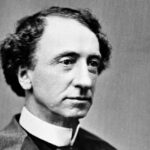By Jonathon Van Maren
It’s always been hard to figure out what Glenn Beck is all about, because he always seems to be in the midst of some great transformation. As a young radio host, he was an alcoholic and a drug addict watching his marriage implode because of his substance abuse, launching him on a journey to sobriety and spirituality. He became a Mormon with his second wife, Tania, in 1999. First at CNN and then at FOX News, Glenn Beck became a conservative mega-star, using his famous black chalkboard to lay out how, exactly, progressives were taking over America. Only he, Glenn Beck, was honest enough to expose the lies and tell everyone what was really happening. He spoke with all the passion of a freshman political science major who has just discovered the great conservative thinkers, and couldn’t wait to tell everyone else about them.
It’s hard to exaggerate just how popular Glenn Beck was at his peak. I heard him speak at CPAC in 2010, and the lineup to get into the conference hall went into triple rows down the halls of the hotel and wrapped around the building. His speech attracted more fans than any of the governors, or Vice President Dick Cheney, or Andrew Breitbart. When his chalkboard was rolled out onto the stage, the crowd responded with a deafening roar. A year later, he had left FOX News to branch out on his own, saying that his show had “become a movement.” He launched Glenn Beck TV, which later became his online Internet news and opinion service, The Blaze.
But for the last year or so, Beck appears to be undergoing yet another transformation. He published an op-ed in the New York Times, explaining his sympathies with Black Lives Matter, which announces in its platform that they are “committed to disrupting the Western-prescribed nuclear family structure.” He has repeatedly apologized for being a “divisive” figure, which is rather confusing considering the fact that he is a political commentator. After portraying Barack Obama as a secular progressive demigod coming to wreak destruction on the United States, he now says that Obama “made him a better man.”
Now, I have no problem with someone recognizing that their rhetoric has gotten too heated and too hyperbolic, and that they’ve stepped over the line somewhat. Nearly every commentator has done this at some point or another, and nearly everyone has had to take something back. Nor do I have a problem with Glenn Beck’s rigid opposition to Donald Trump for the duration of the primaries and the election, which made him a nearly weekly target over at Breitbart—I shared nearly all of his concerns, and then some. But Beck’s latest step in his transformation is what took me somewhat aback: His embracing of far-left figures like Samantha Bee, of the adorably named TV show “Full Frontal.”
Dressed in intentionally ridiculous Christmas sweaters, Beck sat down with Bee to let her know that a new alliance had to form in American media, an alliance of principled opposition to “Trumpism,” whatever that is. “I believe you don’t want to do damage,” Beck pleaded with her. “As a guy who has done damage, I don’t want to do any more damage.” Bee nodded along as Beck warned her that she was doing the same thing he was—using catastrophist language that would inevitably divide rather than unite people. For the duration of the appearance, Beck presented himself as a penitent man who desperately did not want his new friend Bee to do what he had done.
The segment, which has gained a lot of attention from the media and the blogosphere, was confusing. I understand that many people have realized it is essential to get out of our echo chambers and talk to each other, and that cordial relations with our ideological opponents are important. But Beck presented his foray onto Full Frontal as the beginning of an alliance with Bee against “Trumpism”—before we even know what “Trumpism” is, and even though we know it can’t be worse than the ideas that Bee puts forward on a weekly basis. Beck’s transformation has now gone far beyond the principled opposition of Never Trumpers like David French of the National Review or Russell Moore of the Southern Baptist Convention or Ben Shapiro of the Daily Wire. The Review does what any good conservative outlet would do: They criticize Trump when he does the wrong thing, and support him when he does the right thing. Ben Shapiro does a segment called “Good Trump, Bad Trump.” Many conservatives have noted with great caution that the selections Trump is making are beginning to look, ironically, like the Never Trump’s dream team. So for starters, Beck isn’t actually moving away from his catastrophist ways—he’s simply transferring them over to Trump, the new incoming president. Based on Beck’s business modus operandi, this does makes a lot of sense.
There’s one other thing about his new “alliance” with Samantha Bee that made me do a double-take: Bee is rapidly creating a reputation as Big Abortion’s loudest mouthpiece on late-night TV. After Trump condemned late-term abortion during the presidential debate, Bee used a bullhorn to claim that partial-birth abortion didn’t exist—George W. Bush banned the procedure—while defending late-term abortion, a grotesque carnage that involves stabbing a developing baby in the skull and severing limbs. Only a few days after her love-in with Beck, she used her platform to claim (stupidly) that the Bible doesn’t forbid abortion, and defended the corpse-selling Planned Parenthood. Samantha Bee is not one of those liberals who, like Jon Stewart, for example, admits that he is uncomfortable with abortion and sees both sides. “I can be incredibly certain about so many issues and get my dander up,” Stewart admitted. “[Abortion] is one that I can’t. And it’s the one that I probably—in the culture—struggle with the most. I think it is a very difficult issue.” Bee feels no such discomfort.
So why is it, then, that Beck feels the need to align with radical abortion supporters like Bee? Opening a dialogue with abortion activists is one thing—most of my job as a pro-life activist involves talking to pro-choice people and persuading them to recognize the value of human life. But Beck does not appear to be talking to Bee in order to persuade her of anything. Rather, he says, he wants to side with her against whatever “Trumpism” will turn out to be—and again, we don’t know that is yet. What I don’t understand is why Beck would give Samantha Bee the benefit of the doubt over Mike Pence, and Betsy DeVos, and Tom Price, devout pro-lifers who would presumably share much of Beck’s worldview.
I remember Beck doing many programs on abortion, both on FOX—his one-hour special with Lila Rose was brilliant—and more recently his interviews with David Daleiden on the Planned Parenthood baby parts scandal. He is obviously pro-life, and has talked to some of the best undercover journalists and activists out there. He knows just how ghoulish and horrible the human destruction of the abortion industry is. So why does Bee’s overt and out-front support of these practices not give him pause? Why is it that those who cautiously support Trump in hopes that he will restrain the killing or make judicial appointments that could give the pro-life movement its biggest wins in decades are now, seemingly, radicals to join with Bee in opposing? Why does Beck want to help “prevent” her from doing damage when she is already defending those who physically destroy babies in the womb? Doesn’t that qualify as “damage”?
It seems to me that in his opposition to Donald Trump, Glenn Beck has perhaps forgotten some of the most important values that there are, values like respect for the sanctity of all human life. I agree that we should always be talking to our ideological opponents, and I try to make a habit of doing so myself. I agree that our relations should be cordial, even amiable—the pro-life view, after all, is that every human being is worthy of dignity. We’ll soon find out soon what sort of president Donald Trump turns out to be. We’ll find out if he holds to his promises to the pro-life movement. But we already know what Samantha Bee thinks, and to align against those trying to save the lives of pre-born babies with those who advocate for their physical destruction is a grave mistake.









He is trying to be all things to all people. I stopped following Beck a long time ago because he became “two-minded” and that “confusing conversations” became the norm. I found him frustrating to follow. People constantly incarnating themselves leaves people confused and wondering if they can trust the person. Me, I stopped. By the way, I live in Canada.
Jonathan–first of all, I love you man. Your voice is so needed in time right now. I like the article, but I think we are taking the concept of “alliance” too far. Glenn doesn’t like or get Trump, but he was never a part of a NeverTrump movement. He just felt Cruz was far better as a choice (so do I). I, like Glenn, am skeptical about Trump, and I’m sure that Beck will praise Trump when he does something right and criticize his mistakes likewise. His interview with Samantha isn’t the full story and they are not supporting each others’ ideas. He is staunchly anti-abortion and he is not siding with Samantha Bee on this concept. He would shudder at the thought. But Samantha is so used to her bubble that she never sees the other side–if there’s no dialogue ever, then how can the left see any error of their ways? Glenn has just been trying to see where he and some members of the other side might have SOME agreement. Not sacrificing principle, not changing direction, just…understanding. It’s the first step to healing. We have to stop attacking each other when we’re defending truth and righteousness. Attacking each other and hurling insults offends the Spirit and people can’t connect or understand in that environment. Also, I think that the interview had some strategic editing that made things kinda creepy anyway (for comedic effect, I guess). Glenn is still bold and forceful about the Constitution and is just as strongly anti-progressive. I find this kind of thing brave. Christ didn’t preach behind a wall. He went out among the people.
To get a larger outlook, here is his interview with Samantha on Glenn Beck’s radio program before the airing of her show’s interview: https://soundcloud.com/glennbeck/beck-blitz-samantha-bee-visits-glenn
I think it adds some perspective. He is not aligning with her. Maybe he can’t persuade her to change her mind. But one would never know if we don’t try. My sister is a far left super lib and accepts abortion as a normal choice. It makes me sick. But she’s still my sister and still love her, despite her crazy.
And I do think that he aligns with the people you’ve mentioned on pro-life issues and many other things. He disagrees with Betsy DeVos on Common Core, though (and so should you). The only difference in Beck I see is that he started a wonderful fire that lit up the nation. He used to throw gasoline on that fire. I don’t think he does that anymore because it burned a few people and a few bridges. He is content to see that while the fire burns, he might get a better message through smoke signals than targeted flairs.
Glenn Beck is often insightful because he takes his Mormon religion seriously. And because the Mormon faith is based largely on a Judeo-Christian worldview it means he gets there is real evil, he understands there is a reason to stand with the losing side, and he knows that our loyalty shouldn’t belong to the State, or our party, but to God. When Beck is right it is because he is taking his faith seriously, and taking principled stands that are often largely based on Scripture.
But it is also his Mormonism that leads him to errors like the one you’re laying out here. When he has Christians on his show he talks of them as being brothers and sisters – his Mormonism has him minimizing huge differences about the nature of God the Father and Jesus and the Devil and the fall into sin. All these differences, that on the one hand, he holds to be so important it is vital for him to be Mormon, and not, say, Baptist, are also treated as unimportant. This strange dichotomy can be seen in how Mormons want to be called Christian (why make so much of the differences!) but wouldn’t think of calling Christians Mormons (because, after all, The Church of the Latter Day Saints is the one true church!).
This same strange dichotomy come out in the Samantha Bee exchange. Bee opposes Beck’s strongly held position on abortion, but they agree about Trump, so they can be best buds. Sometimes the differences matter; sometimes they don’t.
And don’t be surprised when the principled pro-life Beck makes a reappearance and tackles Bee’s pro-abortion views. He’s trying to be good, and he’s eager to fight evil. But it is Mormon faith underpinning it all, which means as close as it is to the Christian understanding, it is still foundationally confused.